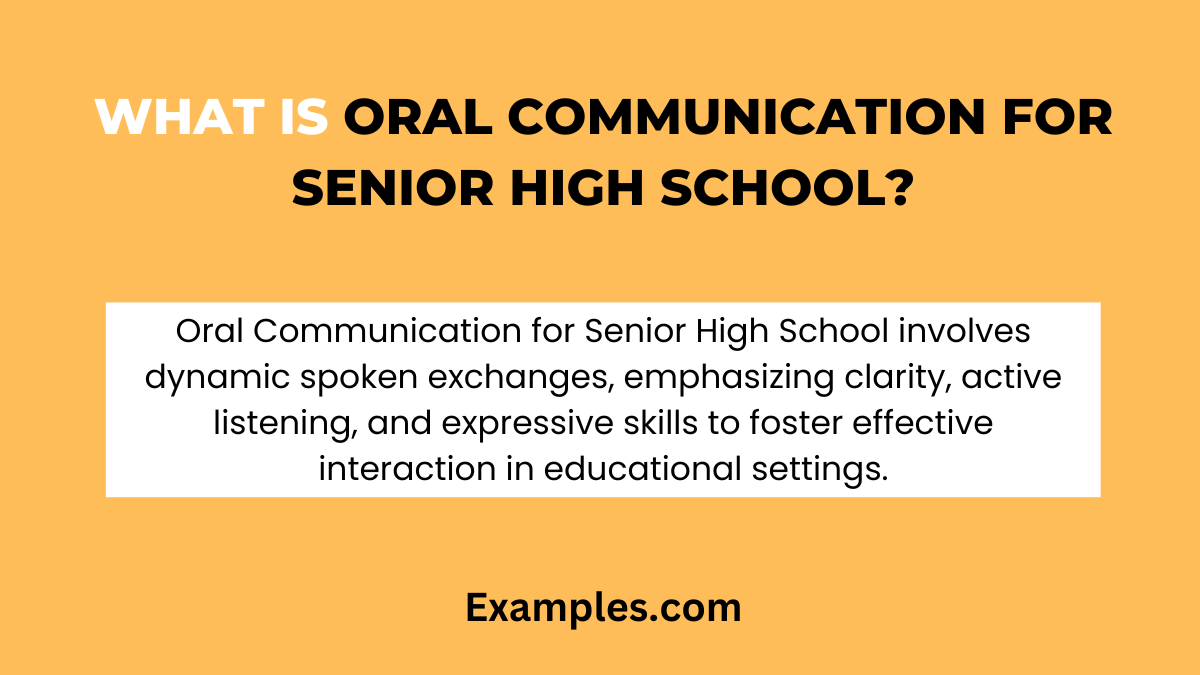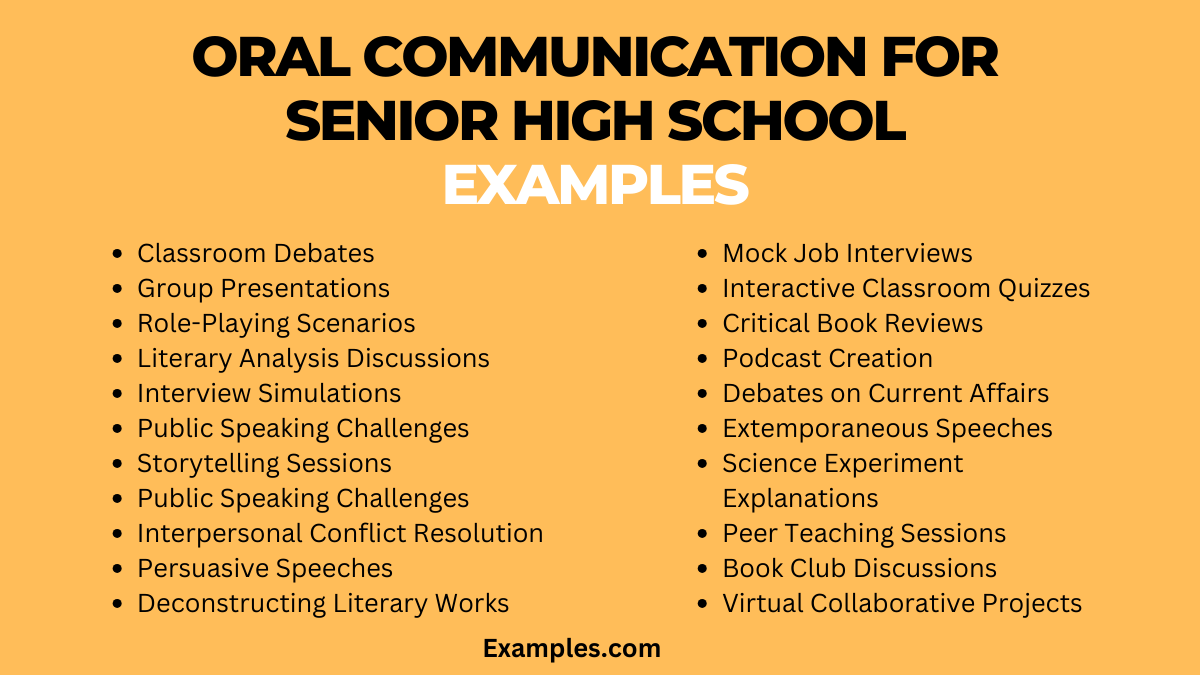29+ Oral Communication for Senior High School Examples
Embark on a comprehensive journey into Oral Communication for Senior High School with our Complete Guide, delving into vital aspects and Communication Examples. Navigate classroom scenarios, real-life applications, and literary insights. Uncover the importance of this subject, gain practical tips for effective communication, and explore a rich tapestry of 100 examples to elevate your oral communication skills. Let this guide be your companion in honing essential communication skills for the Senior High School experience.
What is Oral Communication for Senior High School?

Oral Communication for Senior High School refers to the dynamic exchange of information and ideas through spoken words within an educational setting. It encompasses verbal and nonverbal communication skills, fostering effective interaction among students, educators, and other stakeholders. The emphasis is on clarity, active listening, and expressive communication to facilitate understanding in classroom, real-life, and literary contexts.
What is the Best Example of Oral Communication for Senior High School?

A prime example of Oral Communication for Senior High School is evident in collaborative group discussions. In these scenarios, students actively participate, sharing perspectives, seeking clarification, and engaging in constructive dialogue. This example showcases effective verbal communication skills, active listening, and collaborative interaction, emphasizing the practical application of oral communication in the academic journey of Senior High School.
30 Oral Communication for Senior High School Examples

Some of the examples for Oral Communication for Senior High School Examples are as follows:
- Classroom Debates: Engage in structured debates to express opinions on relevant topics, enhancing critical thinking and articulation skills.
- Group Presentations: Collaborate with peers to deliver presentations, honing teamwork and communication abilities.
- Role-Playing Scenarios: Act out real-life situations, refining communication in various contexts.
- Literary Analysis Discussions: Explore literature through verbal analysis, fostering interpretation and expression.
- Interview Simulations: Practice interview skills for future endeavors, enhancing communication in professional settings.
- Storytelling Sessions: Develop narrative skills by sharing personal or fictional stories, enhancing creativity and expression.
- Public Speaking Challenges: Addressing the class on various topics builds confidence and effective verbal delivery.
- Interpersonal Conflict Resolution: Engage in discussions to resolve conflicts, developing mediation and communication skills.
- Collaborative Project Meetings: Coordinate with peers on projects, enhancing teamwork and effective communication.
- Expressing Personal Opinions: Encourage open dialogue on personal viewpoints, promoting individual expression.
- Persuasive Speeches: Craft compelling speeches to persuade and influence, refining rhetorical and persuasive communication.
- Deconstructing Literary Works: Analyzing literature through verbal discussion deepens understanding and communication skills.
- Story Narration Competitions: Engage in friendly competitions to showcase storytelling abilities, emphasizing clarity and expression.
- Mock Job Interviews: Simulate job interviews, practicing effective verbal communication for future professional settings.
- Interactive Classroom Quizzes: Participate in interactive quizzes to enhance responsiveness and active participation.
- Critical Book Reviews: Express opinions on literary works, fostering critical thinking and effective communication.
- Podcast Creation: Collaborate on creating podcasts, refining verbal expression for a broader audience.
- Debates on Current Affairs: Discussing current events promotes awareness and effective articulation of opinions.
- Drama Script Readings: Reading and interpreting drama scripts develops expressive communication skills.
- Classroom Story Circles: Form story circles to share individual narratives, encouraging active listening and response.
- Extemporaneous Speeches: Improvise speeches on given topics, enhancing impromptu verbal communication.
- Science Experiment Explanations: Articulate scientific concepts through experiment explanations, refining technical communication.
- Model United Nations (MUN): Participate in MUN conferences, honing diplomatic and persuasive communication.
- Peer Teaching Sessions: Conduct sessions to teach peers, refining instructional and communicative abilities.
- Book Club Discussions: Participate in book clubs, fostering literary discourse and expression.
- Classroom Surveys and Reports: Present findings from surveys, developing research communication skills.
- Virtual Collaborative Projects: Engage in online projects, refining digital communication and collaboration.
- Cultural Exchange Presentations: Share cultural aspects in presentations, promoting diverse communication.
- Media Analysis Discussions: Analyze media content through verbal discussion, fostering media literacy and expression.
- Creative Writing Workshops: Participate in workshops to express creativity through written and verbal communication.
Oral Communication for Senior High School in Class Examples
Discover the dynamic realm of oral communication within Senior High School classrooms through these 10 engaging examples:
- Class Debates: Encourage students to research and present well-constructed arguments, fostering critical thinking.
- Literary Discussions: Promote expressive dialogue about literature, improving comprehension and analytical skills.
- Collaborative Projects: Stimulate group activities where effective communication is vital for project success.
- Role-playing Scenarios: Develop empathy and communication skills through interactive role-playing exercises.
- Oral Presentations: Hone public speaking abilities with structured presentations on various topics.
- Peer Feedback Sessions: Cultivate constructive communication by encouraging students to provide feedback to their peers.
- Socratic Seminars: Facilitate thought-provoking discussions, encouraging active participation and critical reflection.
- Interactive Quizzes: Foster engagement by incorporating oral communication in quiz formats.
- Problem-solving Activities: Develop teamwork and communication skills through collaborative problem-solving tasks.
- Class Reflections: Conclude lessons with oral reflections, encouraging students to express insights gained during the class.
These examples offer a diverse range of activities, enhancing oral communication skills within the Senior High School classroom setting.
Oral Communication for Senior High School in Real Life Examples
Oral communication in real-life scenarios empowers Senior High School students with practical skills for diverse situations.
- Job Interview Preparation: Practice answering common interview questions to enhance verbal articulation.
- Community Service Project Presentation: Effectively communicate project goals and outcomes to stakeholders.
- Parent-Teacher Conferences: Convey student progress and discuss areas for improvement with parents.
- Public Speaking Competitions: Showcase persuasive skills through compelling speeches on relevant topics.
- Networking Events: Engage confidently in conversations with peers and professionals to build connections.
- Debating Current Affairs: Discuss and debate real-world issues to develop critical thinking and communication.
- Participating in Workshops: Express opinions and collaborate in workshops for skill development.
- College Application Interviews: Clearly articulate personal achievements and aspirations to admissions.
- Conducting Surveys: Collect and present data effectively in class or community surveys.
- Negotiating Group Projects: Navigate group dynamics and negotiate ideas for collaborative success.
Engaging in oral communication within the realm of literature enriches the Senior High School experience, fostering a deeper connection with literary content.
- Character Analysis Discussions: Express interpretations and opinions on characters in novels or plays.
- Book Club Conversations: Engage in thoughtful dialogues about literary themes and symbolism.
- Debating Literary Criticism: Discuss various interpretations of a literary work to refine critical thinking.
- Analyzing Poetry: Articulate feelings and interpretations when analyzing poems in class.
- Role-Playing Literary Characters: Bring characters to life through expressive role-playing activities.
- Participating in Literary Seminars: Express views and insights in seminars discussing literary works.
- Exploring Cultural Context: Discuss how cultural contexts influence literary works and perspectives.
- Presenting Book Reports: Clearly communicate the essence of a book in a concise and engaging manner.
- Creating Story Narratives: Collaborate on crafting original stories and presenting them orally.
- Comparative Literature Discussions: Articulate comparisons between different literary works to deepen understanding.
What is oral communication subject in senior high school?
Oral Communication is a crucial subject in Senior High School, aiming to equip students with essential communication skills vital for academic success and personal growth. Let’s delve into the key aspects of this subject:
1. Definition of Oral Communication Subject:
- Oral Communication Subject involves the study and practice of effective spoken communication.
2. Curriculum Overview:
- The curriculum covers a range of communication skills, including public speaking, interpersonal communication, and presentation techniques.
3. Importance in Academic Settings:
- Emphasis on oral communication is designed to enhance students’ abilities to express ideas, participate in discussions, and deliver presentations.
4. Skill Development:
- Students develop clear articulation, active listening, and confident expression through various interactive activities.
5. Real-Life Applications:
- The subject integrates real-life scenarios, encouraging students to apply communication skills in diverse contexts.
6. Public Speaking Emphasis:
- Public speaking is often a focal point, enabling students to overcome stage fear and communicate effectively to a broader audience.
7. Interpersonal Communication:
- Emphasis on building interpersonal communication skills aids in fostering positive relationships among students.
8. Collaborative Learning:
- Group activities and collaborative projects contribute to the development of teamwork and effective communication within a team.
9. Assessments and Presentations:
- Assessments often include individual and group presentations, allowing students to showcase their communication prowess.
10. Practical Life Skills:
- Beyond academics, the subject imparts practical life skills, preparing students for effective communication in various social and professional settings.
Why is Oral Communication Important in Senior High School?
Oral communication holds immense significance in the Senior High School educational landscape. It serves as a foundational skill essential for academic success and personal development. The importance lies in:
- Academic Excellence: Effective oral communication enhances students’ ability to articulate ideas, participate in class discussions, and present information, contributing to academic achievement.
- Future Career Readiness: Developing strong communication skills prepares students for future professional endeavors, where effective verbal expression is crucial.
- Collaborative Learning: Oral communication fosters collaborative learning environments, enabling students to engage with peers, share perspectives, and build a sense of community.
- Critical Thinking: Expressing thoughts orally promotes critical thinking as students learn to organize and communicate ideas coherently.
- Confidence Building: Engaging in oral communication builds confidence, empowering students to express themselves confidently in various contexts.
- Social Skills Development: It cultivates essential social skills, aiding students in building meaningful relationships and navigating social interactions.
- Leadership Development: Effective communication is a cornerstone of leadership. Students develop leadership qualities through articulate expression and effective communication.
- Real-World Application: Oral communication skills are directly applicable in real-world scenarios, ensuring students are well-prepared for life beyond the classroom.
Tips for Effective Oral Communication for Senior High School?
Achieving effective oral communication involves mastering several key skills. Here are tips tailored for Senior High School students:
- Active Listening: Cultivate active listening skills to understand and respond thoughtfully to peers and instructors.
- Clear Articulation: Practice clear and concise articulation of thoughts to enhance understanding during discussions and presentations.
- Body Language Awareness: Understand the impact of nonverbal cues, maintaining positive and engaging body language.
- Structured Presentations: Learn to structure presentations logically, ensuring a clear introduction, body, and conclusion.
- Use of Visual Aids: Incorporate visual aids to complement verbal communication, making presentations more engaging and informative.
- Peer Feedback: Encourage and provide constructive feedback to peers, fostering a culture of improvement in communication skills.
- Public Speaking Practice: Engage in regular public speaking exercises to build confidence and polish presentation abilities.
- Diversity Appreciation: Recognize and appreciate diverse communication styles, fostering an inclusive and respectful communication environment.
- Confidence Building Activities: Participate in activities that boost self-confidence, contributing to more assured oral communication.
- Continuous Improvement: View oral communication as a skill to be continually refined. Seek opportunities for improvement and growth throughout your academic journey.
In conclusion, the comprehensive exploration of Oral Communication for Senior High School, as presented in the guide, underscores the subject’s multifaceted nature and its critical importance in shaping young minds for both academic and personal success. The guide effectively highlights how oral communication is not just about speaking, but involves active listening, clear articulation, effective body language, and the ability to adapt to diverse communication scenarios.
For students and educators seeking to further their understanding and skills in this area, the Toastmasters International Education Program, offers valuable resources and workshops aimed at enhancing public speaking and leadership skills. This program is particularly beneficial for high school students as it provides practical experience in a supportive environment.
Additionally, the National Communication Association provides a wealth of resources tailored for secondary education. These resources cover various aspects of communication skills, offering students and educators access to contemporary research, teaching strategies, and learning tools to enhance oral communication competencies.



